#or even just book recommendations
Text
"internet historian's alt-right anyways" "great day to have never liked james somerton" "never even heard of illuminaughtii before this lol"
that's great buddy but don't go around thinking you're immune to this. if you're not looking for plagiarism, you likely won't notice it unless its egregiously obvious. hell, you've probably consumed plagiarized content without even realizing it. even hbomb pointed out that these people disguised what they presented pretty well as long as you didn't try and dig deeper. don't come away just thinking of this as a callout piece, take this as an important lesson about vetting your sources. if googling scripts in quotes was enough to expose the original, we should all start doing that shit!!
edit: it got a little too doomer-y a little too fast so one quick addition
this is hbomb's curated playlist of queer creators, many of whom were victims of plagiarism
this is producer kat on reddit calling for any more plagiarism discoveries and for queer content creators to be uplifted
please take some time to uplift these creators and recommend any you know! if you can help uncover more of the original creators whose work was lifted that would be great too :)
UPDATE- From Hbomb's twitter: "We're in the process of cataloguing everyone James Somerton plagiarised and finding their contact information. Which is quite a task, so to help us out: If you see this and happen to be one of the people Somerton stole from, please email us at [email protected]"

edit 2:

#hbomberguy#james somerton#illuminaughtii#internet historian#vice#ign etc have had issues with plaigarism before#this isnt just some youtuber scandal remember#even books can fall victim to this#kaz rowe's history vids exemplify this pretty well#i'd recommend the triboulet ass slapping myth one if you want a good breakdown#and somerton absolutely had problems with the way he discussed foreign media and anyone that wasnt a cis gay man#but considering most of his ideas werent his own that doesnt dismiss the original authors' work keep in mind
31K notes
·
View notes
Text
Often when trans women ask me when I'm performing next, and I tell them that it's a queer/trans event, they will tell me that they'd rather not go because they do not feel comfortable or safe in those spaces, that they have been dismissed or belittled at such events before. Even trans women who are dyke- or bisexual- identified often don't feel welcome or relevant in queer/trans spaces. And whenever a trans woman or ally points out aspects about the queer/ trans community that contribute to these feelings of irrelevancy and disrespect—such as the way our community coddles those who support trans-woman-exclusionist events or who make trans-misogynistic comments—we are described as being "divisive." This use of the word "divisive" is particularly telling, as it implies that "queer/trans" represents a uniform movement or community—a "oneness"—rather than an alliance where all voices are respected.
Julia Serano, Whipping Girl. Published 2007.
#reading#just finished it and this from the final chapter was my fav moment and one of the few times i was nodding along#the book is solid in certain places#even incisive at times#but it is so theoretically confused and downright wrong in some of its foundatioms#that i CANNOT recommend it as an introduction to transmisogyny and i can only SUGGEST it as a v critical read#may say more later#whipping girl#transmisogyny
4K notes
·
View notes
Note
what makes a poem a poem? does it have to be written in a certain way? is this question a poem if i want it to be?
Fun question! This is just my personal sense as an avid reader and less-avid writer of poetry, but for me it’s useful to distinguish (roughly) between poetry as a genre and poetry as an attitude or philosophy through which language and the world can be understood. And of course these two go hand in hand. I see poetry the genre as essentially a type of literature where we as readers are signaled, somehow, to pay closer attention to language, to rhythm, to sound, to syntax, to images, and to meaning. That attentive posture is the “attitude” of broader poetic thinking, and while it’s most commonly applied to appreciate work that’s been written for that purpose, there’s nothing stopping us from applying that attentiveness elsewhere. Everywhere, even! That’s how you eventually end up writing poetry for yourself, after all. There’s a quote from Mary Ruefle floating around on here that a lot of folks have probably already seen, but it immediately comes to mind with this ask:
“And when you think about it, poets always want us to be moved by something, until in the end, you begin to suspect that a poet is someone who is moved by everything, who just stands in front of the world and weeps and laughs and laughs and weeps.”
Similarly, after adopting the attentive posture of poetics, there’s plenty of things that can feel or sound like a poem, even when they perhaps were not written with that purpose in mind. I’ve seen a couple of these “found poems” on here that are quite fun—this one, for example. The meaning and enjoyment you may derive from the language of a found poem isn’t any less real than that derived from a poem written for explicitly poetic purposes, so I don’t see why it shouldn’t be called poetry.
That said, I do think that if you’re going to go out and start looking for poetry everywhere, it’s still important to have a foundation in the actual language work of it all. Now, this doesn’t mean it has to be “written in a certain way” at all! But it does mean that in order to cultivate the attentiveness that’s vital to poetry, one needs to understand what makes language tick, down at its most basic levels. It will make you better at reading poetry, better at writing it, and better at spotting it out in the wild.
Mary Oliver’s A Poetry Handbook is an extraordinary resource to new writers and readers, and a great read for more experienced folks as well. Mary Oliver’s most popular poems are all to my knowledge in free verse, and yet you might be surprised to find her deep appreciation for metrical verse (patterns of stressed/unstressed syllables), as well as for the most minute devices of sound. In discussing the so-called poetry of the past, she writes,
“Acquaintance with the main body of English poetry is absolutely essential—it is the whole cake, while what has been written in the last hundred years or so, without meter, is no more than an icing. And, indeed, I do not really mean an acquaintanceship—I mean an engrossed and able affinity with metrical verse. To be without this felt sensitivity to a poem as a structure of lines and rhythmic energy and repetitive sound is to be forever less equipped, less deft than the poet who dreams of making a new thing can afford to be.”
In another section, after devoting lots of attention to the sounds at work in Robert Frost’s “Stopping by Woods on a Snowy Evening”, she writes,
“Everything transcends from the confines of its initial meaning; it is not only the transcendence in meaning but the sound of the transcendence that enables it to work. With the wrong sounds, it could not have happened.”
I hope all this helps to get across my opinion that what makes a poem a poem is not just about the author's intention, and not just about meaning (intended or attributed), but also about sound and rhythm and language and history, all coalescing into something that rises above the din of a language we would otherwise grow tired of while out in our day-to-day lives.
I'll always have more to say but I'm cutting myself off here! Thanks for the ask
#ask#discussion#does this even answer the question? lol#anyways even if you're not huge on mary oliver i still highly recommend a poetry handbook#i admit her poetry is only to my taste about 60-70% of the time. but her handbook is a great resource and can stand alone#i actually think oliver wrote a whole other book just about metrical verse too. for people who are into that#also if you're someone who's less interested in the question 'what is poetry?' and more into questions like#why is poetry? can poetry survive? what the fuck happened to poetics in the twentieth century?#i recommend the witness of poetry by czeslaw milosz#an older book—actually a collection of lectures—but an absolute game-changer for me#not a poll
463 notes
·
View notes
Text
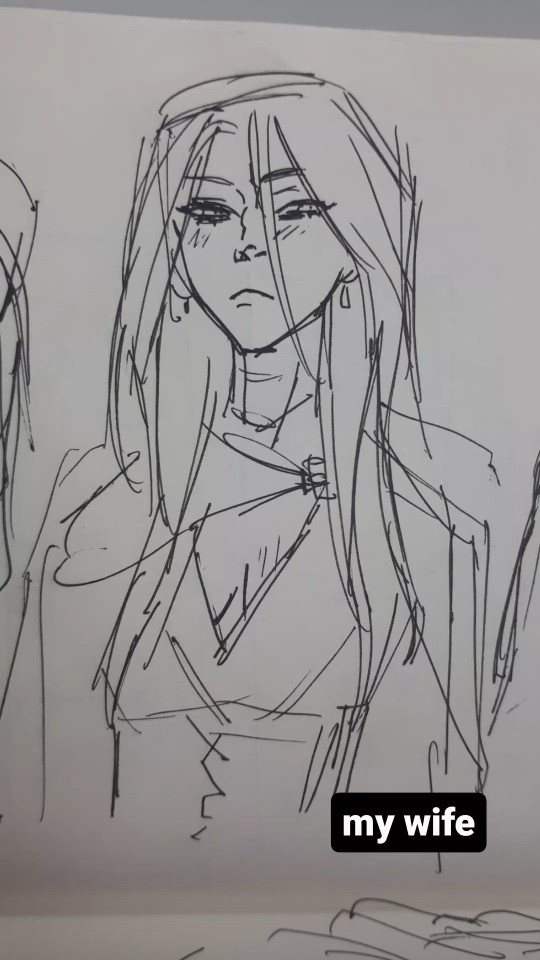

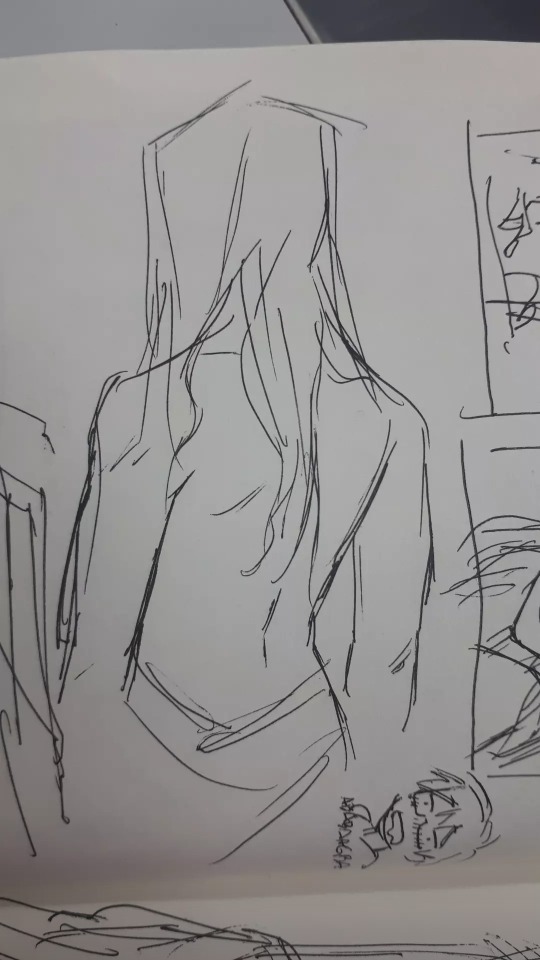
IANTJE!!!!!!!!! GRGBWHBBBDGAHHAHH
#sorry#I NEED HER#ianthe leave harrowhark alone come kiss ME INSTEAD!!!!!!!#not harryanthe btw#just sketched a scene from tje book#ok anyways#shes so hot#HONESTLY IF ANYONE HAS RECOMMENDATIONS FOR IANTHE/FEM!READER FICS IM DESPERATE#IVE READ ALL OF THEM ON AO3 ALREADY PLEASEEEEEE#IVE EVEN READ THE AWFUL ONES (not a good experience)#ianthe tridentarius#harrow the ninth#tlt#the locked tomb#the locked tomb ianthe#harrowhark nonagesimus#harrowhark the first#ianthe the first#the locked tomb fanart#sketchbook#i know tje lesbian community got my back on this one (hopefully)
552 notes
·
View notes
Text
"For both bonobos and chimpanzees, the bodies of the dead evoke many emotions. Even if the process often begins with trauma and confusion, typically corpses shift to a liminal status; not alive, but equally not a lump of meat. They're more intensively manipulated than hunted animals, and carried for longer. In some – if not all – cases, the eaters must know what and who they're consuming. Cannibalism is very probably a powerful means by which individuals and groups process the impact not only of killings carried out on emotional impulses, but other deaths too. In other words, it's about grieving.
[...]
"Shift these scenarios to Neanderthals, and add into the mix their far greater cognitive sophistication, and lives that revolved around using lithics. Suddenly it's not difficult to envision how skills in carefully taking apart hunted carcasses might be transposed into a grieving process that involved butchery and cannibalism as acts of intimacy, not violation."
Rebecca Wragg Sykes, Kindred: Neanderthal Life, Love, Death and Art
#quotes#rebecca wragg sykes#kindred: neanderthal life love death and art#what could be a better way to start off this new year than#💛💛💛 cannibalism 💛💛💛#& 💖💖💖 grief 💖💖💖#this book is excellent btw if you're interested at all in neanderthals i HIGHLY recommend it#it is dense with data but the author takes care to write about it in an accessible way#& with a sense of profound wonder that suffuses everything#like even if you don't read through the whole thing i encourage picking up a copy just to peruse the little creative writing vignettes#at the top of each chapter
143 notes
·
View notes
Text
The worst part about reading in a genre where you have low expectations (in this case, Christian historical fiction) is that when a book impresses you, you have no idea if it's actually good or if you're just overly impressed because it was a fraction of a degree better than the usual garbage.
#basically lately anytime i read a christian fiction book that isn't romance-based i find myself surprised by the quality#i do think that some christian publishers are getting better#and trying to tell stories that dig deeper into real faith and messy issues#instead of making only vapid squeaky clean prayer-filled tropefests#but i'm not sure *how much* better#because anything above the low bar feels like great literature#the most recent is 'in a far-off land' by stephanie landsem#and let me tell you setting the prodigal son in 1930s hollywood is a genius concept#i have some issues with the history and the mystery#but the characters!#it has been a long time since i cried this hard over a book#several chapters of solid waterworks#(and i also have the issue of figuring out if it's actually that moving or if i'm just hormonal/sleep-deprived)#i keep thinking about this book but also i worry about recommending because what if it's actually terrible by normal book standards?#(also the author DOES NOT understand the seal of confession and i was SHOCKED to find that she's actually catholic)#but also looking at the reviews makes it clear that if most of christian fiction is vapid garbage it's these reviewers' fault#here you have something that's digging into sin and darkness and justice and mercy and these people are just#'how can it call itself christian fiction if it only mentions god at the end?'#are we reading the same book this WHOLE THING is about god! and humanity and our fallen nature and how this breaks relationships!#your pearl-clutching anytime someone tries to get even a tiny bit realistic is destroying this genre#i'm gonna run out of tags so i'll stop now
57 notes
·
View notes
Note
hello! i hope it's alright to ask you this but i was wondering if you have any recommendations for books to read or media in general about the history of judaism and jewish communities in egypt, particularly in ottoman and modern egypt?
have a nice day!
it's fine to ask me this! Unfortunately I have to preface this with a disclaimer that a lot of books on Egyptian Jewish history have a Zionist bias. There are antizionist Egyptian Jews, and at the very least ones who have enough national pride that AFAIK they do not publicly hold Zionist beliefs, like those who spoke in the documentary the Jews of Egypt (avaliable on YouTube for free with English subtitles). Others have an anti Egyptian bias- there is a geopolitical tension with Egypt from Antiquity that unfortunately some Jewish people have carried through history even when it was completely irrelevant, so in trying to research interactions between "ancient" Egyptian Jews and Native Egyptians (from the Ptolemaic era into the proto-Coptic and fully Coptic eras) I've unfortunately come across stuff that for me, as an Egyptian, reads like anti miscegenationist ideology, and it is difficult to tell whether this is a view of history being pushed on the past or not. The phrase "Erev Rav" (meaning mixed multitude), which in part refers to Egyptians who left Egypt with Moses and converted to Judaism, is even used as an insult by some.
Since I mentioned that documentary, I'll start by going over more modern sources. Mapping Jewish San Francisco has a playlist of videos of interviews with Egyptian Jews, including both Karaites and Rabbinic Jews iirc (I reblogged some of these awhile ago in my "actually Egyptian tag" tag). This book, the Dispersion of Egyptian Jewry, is avaliable for free online, it promises to be a more indepth look at Egyptian Jews in the lead up to modern explusion. I have only read a few sections of it, so I cannot give a full judgment on it. There's this video I watched about preserving Karaite historical sites in Egypt that I remember being interesting. "On the Mediterranian and the Nile edited by Harvey E. Goldman and Matthis Lehmann" is a collection of memiors iirc, as is "the Man in the Sharkskin Suit" (which I've started but not completed), both moreso from a Rabbinic perspective. Karaites also have a few websites discussing themselves in their terms, such as this one.
For the pre-modern but post-Islamic era, the Cairo Geniza is a great resource but in my opinion as a hobby researcher, hard to navigate. It is a large cache of documents from a Cairo synagogue mostly from around the Fatimid era. A significant portion of it is digitized and they occasionally crowd source translation help on their Twitter, and a lot of books and papers use it as a primary source. "The Jews in Medieval Egypt, edited by: Miriam Frenkel" is one in my to read pile. "Benjamin H. Hary - Multiglossia in Judeio-Arabic. With an Edition, Translation, and Grammatical Study of the Cairene Purim Scroll" is a paper I've read discussing the Jewish record of the events commemorated by the Cairo Purim, I got it off either Anna's Archive or libgen. "Mamluks of Jewish Origin in the Mamluk Sultanate by Koby Yosef" is a paper in my to read pile. "Jewish pietism of the Sufi type A particular trend of mysticisme in Medieval Egypt by Mireille Loubet" and "Paul B Fenton- Judaism and Sufism" both discuss the medieval Egyptian Jewish pietist movement.
For "ancient" Egyptian Jews, I find the first chapter of "The Story of the Jews: Finding the Words 1000 BC-1492 AD” by Simon Schama, which covers Elephantine, very interesting (it also flies in the face of claims that Jews did not marry Native Egyptians, though it is from centuries before the era researchers often cover). If you'd like to read don't click this link to a Google doc, that would be VERY naughty. There's very little on the Therapeutae, but for the paper theorizing they may have been influenced by Buddhism (possibly making them an example of Judeo-Buddhist syncretism) look here (their Wikipedia page also has some sources that could be interesting but are not specifically about them). "Taylor, Joan E. - Jewish women philosophers of first-century Alexandria: Philo’s Therapeutae reconsidered" is also a to read.
I haven't found much on the temple of Onias/Tell el Yahudia/Leontopolis in depth, but I have the paper "Meron M. Piotrkowski - Priests in Exile: The History of the Temple of Onias and Its Community in the Hellenistic Period" in my to be read pile (which I got off Anna's Archive). I also have some supplemental info from a lecture I attended that I'm willing to privately share.
I also have a document compiling links about the Exodus of Jews from Egypt in the modern era, but I'm cautious about sharing it now because I made it in high school and I've realized it needs better fact checking, because it had some misinfo in it from Zionist publications (specifically about the names of Nazis who fled to Egypt- that did happen, but a bunch of names I saw reported had no evidence of that being the case, and one name was the name of a murdered resistance fighter???)
#cipher talk#I find Leontopolis fascinating because after the first time a bunch of Egyptian Jews built a temple in Egypt a second guy did it#And allegedly had a not terrible scriptural justification! And the temple lasted for THREE EXTRA YEARS after Jerusalem was sacked!#Never let anyone tell you there was only one temple#There's also other stuff but this is what I immediately had#Some books I have I'm pretty sure just aren't good to start with lmao they're about very specific stuff#Modern Middle Eastern Jewish Thought: Writings on Identity politics and culture is interesting and includes Egyptian Jews#But it's definitely got a zionist bias. It's mostly essays#I'd definitely recommend reading up on Joseph Cattaui and Murād Farag because they were simply so influential#Even though Farag was a dumbass that wrote the first Arabic defense of Zionism#Ya‘qub Sannu‘ is also fascinating- he spent a lot of his time defending Muslims to European audiences so some people assumed he reverted#He didn't he just took a hard stance on it. Also he got exiled for criticizing the Khedivate#All 3 are in MMEJT iirc
104 notes
·
View notes
Text

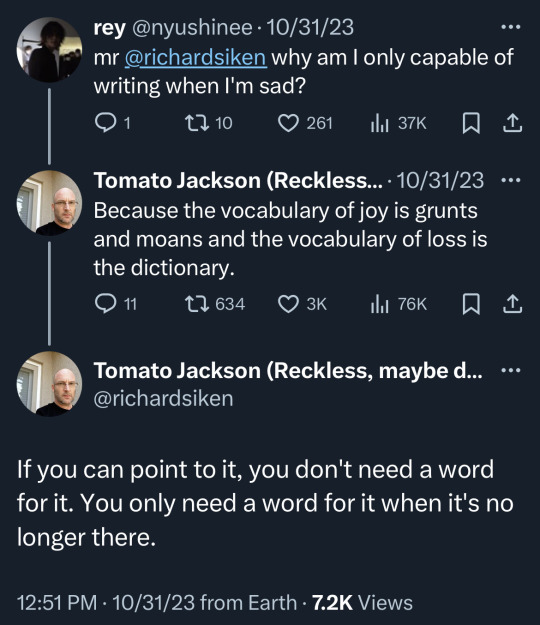
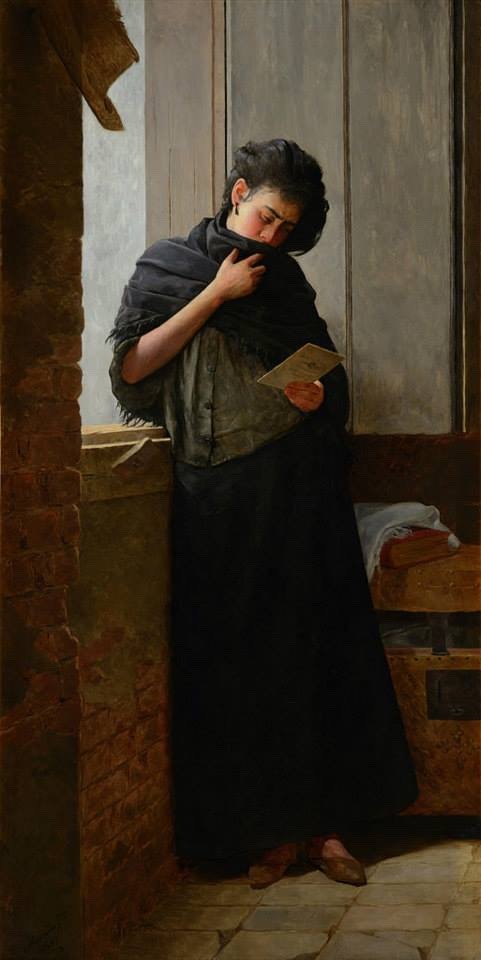
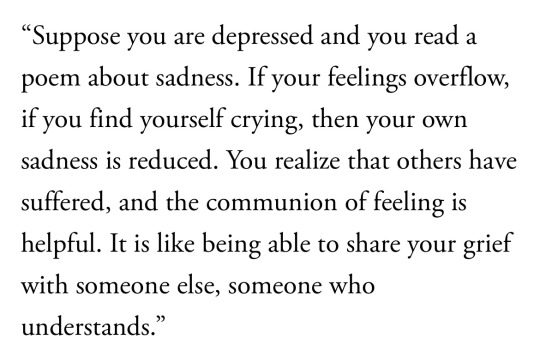

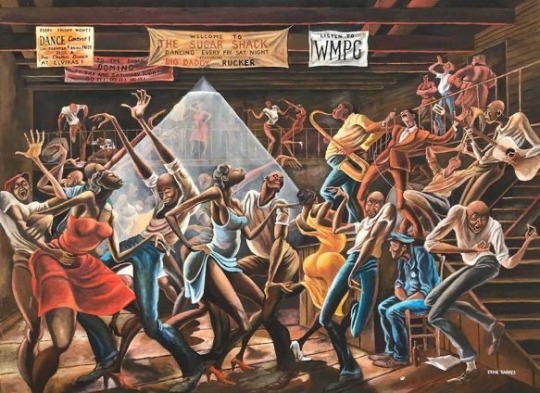



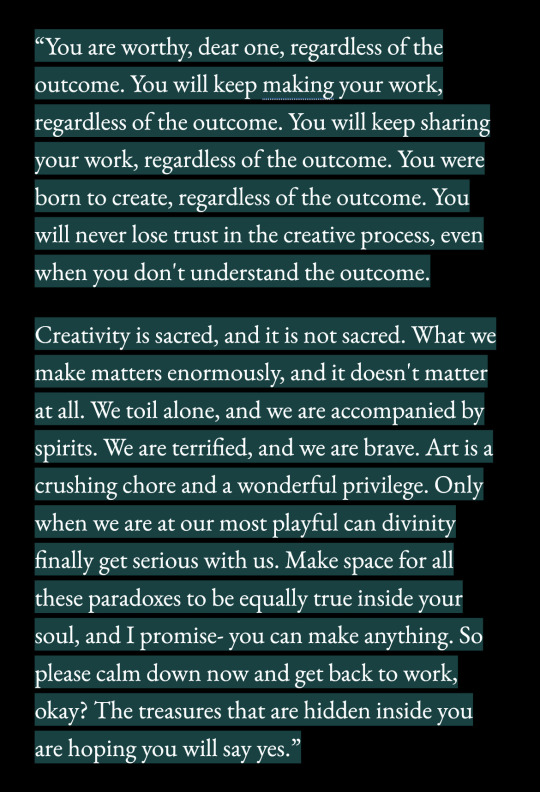
why do we create and why should create that silly thing? bc you gotta :) bc it will matter to someone :) <3
“Give Yourself Permission to Be Creative”, Ethan Hawke | Richard Siken | “Longing” by José Ferraz de Almeida Júnior (1899) | Smiley Blanton, from The Healing Power of Poetry (found in “Mary Oliver Saved My Life” by Greg Cook) | Catcher In The Rye by J.D. Salinger | The Sugar Shack by Ernie Barnes (1976) | the Gospel of Thomas | “Reading books is not just a pleasure: it helps our minds to heal” by Peter Leyland | The Immersive Van Gogh experience, photographed by Ben Davis | Big Magic: Creative Living Beyond Fear by Elizabeth Gilbert
#it matters to someone !!!!#even if that someone’s just you!!!!!#good then!!!#big magic is fuckin life changinggggg#love that book#highly recommend#^^#bbge.weaves#creativity#web weaving#thinking I’ll make more web weaves these are so therapeutic and fun#bbge.text#elizabeth gilbert#van gogh#ethan hawke
62 notes
·
View notes
Photo
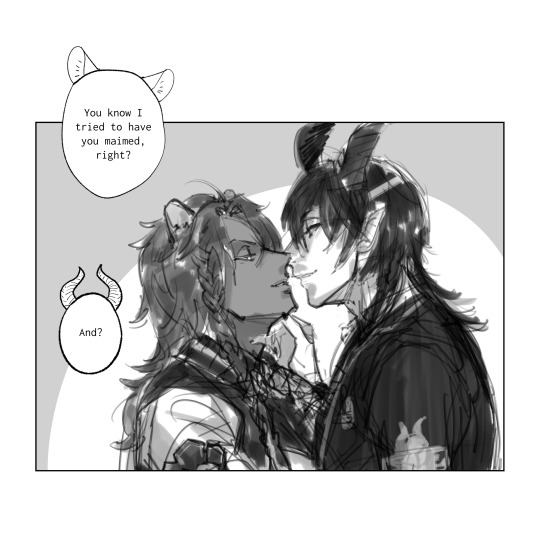
マレレオ
union birthday
#leona kingscholar#malleus draconia#malleleo#malleus x leona#twst#twisted wonderland#i didnt openly ship these two until after union birthday leona story dropped#that interview malleus did with leona changed me#what i expected (jokingly): [explosions]#what i got: [mutual respect]#malleus KNOWS what leona is into#their fanon ship dynamic Shifted when everyone found out#leona genuinely loves this gift from malleus and he doesnt make it a secret at all#its an ancient book of spells and leona even recognizes the language is so old it isnt in common usage anymore#leona says mages and linguists alike would love to get their hands on this kind of thing (malleus wasnt aware the language was that old LOL)#malleus recommends leona read it because he has it back home in the castle library at briar valley and found it interesting#old man book club#(leona is 21 now and malleus is like 100+)#the book is so valuable leona actually got concerned that malleus might have went over budget for his birthday gift?#leona couldve just accepted the gift without thinking about it but it matters to him for some reason#they end up having a whole tangential conversation around how malleus got his hands on this for leona#leona teases about whether malleus had attendants go with him to the antique bookstore#malleus is like of course not and leona is like good i like walking around and shopping on my own too#leona) especially because its in my nature to be considerate in many ways. i'd feel guilty making anyone wait up for me#malleus) oh thats the first i've heard of that. i seem to recall seeing savanaclaw students running in circles looking for you quite often.#and then they tease each other about who gives other students the worse hassle in searching for them#somehow malleus ends up like...i see now. you're here for the same reasons that i am. to experience what you cannot back home#and leona agrees) in as far as its more comfortable living here than at home you're not wrong.#they agree they have a lot in common and can empathize with each other#im still not over it
414 notes
·
View notes
Text
In keeping with my recommendation of Cruel Beauty, an actual good YA book, instead of 🔥hotfire garbage🔥, aka Acotar, I thought I'd recommend another favourite of mine.
So, this time, I'm going to give an alternative recommendation to Fourth Wing by Rebecca Yarros. This post is definitely not inspired by the release of Iron Flame.
Instead please try:
Fireborne by Rosaria Munda❤️🔥
This recommendation is especially for anyone who fell for the advertising when FW first came out, and it was sold as a YA adjacent military dragon fantasy with a slow burn romance.
So if that sounds interesting to you and you want to read an actually well written story, go check out Fireborne.
Fireborne is a YA fantasy, the 1st book of the Aurelian Cycle (a completed trilogy).
It follows its two main characters in a military academy through their training to become dragon riders.
I personally have pitched this series to irl friends as a genderswapped Anastasia (animated movie) with dragons.
The story takes place right after a big revolution. The people overthrew the dragon riding aristocracy.
Our main characters meet up in an orphanage, where they grow up together and end up joining the military academy to become dragon riders.
A lot of the story revolves around the questions that come up when a newly formed government is put through crisis.
All seen through the eyes of the protagonists, who as teenagers are old enough to know what life was like before the revolution, but young enough to have grown up in the new system.
The story does a great job of dealing with the struggles that come with uprooting old deeply ingrained systems of oppression while trying to build a newer fairer system.
The dragons are an integral part of this theme. Unlike FW, in which magical abilities and creatures are added without regard for how they might impact the world or themes, in Fireborne, the dragons are the embodiment of political and military power.
When the aristocracy ruled their oppressive regime, they were the only ones allowed to own and ride dragons. After their fall, the new regime allowed regular people the opportunity to become riders.
However, the number of dragons is still limited, and the new regime, comprised of former revolutionary leaders, want to keep the new riders under their control.
So, in the end, they still come up with a system that allows for abuse and oppression because access to power remains restricted to a chosen few, the dragon riders and those who control them, the newly established government.
These themes make for really complicated and nuanced conflicts without easy solutions. The sequels make a great job with further expanding on these themes.
The military elements also all make sense in this series, and they employ logical means to train their most valuable military assets, their dragon riders unlike FW.
It also features one of my favourite slow burn romances (at least in YA), the relationship has actually depth and tension, while also providing believable reasons why the characters can't just get together.
I'm actually really salty that Fourth Wing took off practically overnight, while Fireborne has been out for ages and has consistently remained underhyped. But I guess it isn’t spicy... 😒
So, for anyone who picked FW up without realising that it is actually just a very trashy smutty romance mascarading as a high fantasy, I highly recommend reading Fireborne which comes with the added perk of not being written by a known zionist.
#fireborne#flamefall#furysong#the aurelian cycle#rosaria munda#dragon books#book recommendations#fw is basically the new acotar#anti fourth wing#anti Rebecca Yarros#anti iron flame#fw is not just badly written#but also problematic in similar ways#the same weird white milk toast progressivism#with some weird undertones#like I know their is a rebellion in FW#but what are they even rebelling#and what is their millitary fighting#nothing makes sense#i guess this makes this post anti sjm as well#anti sjm#anti acotar
65 notes
·
View notes
Text
more historical fiction needs to be set in ww1. bonus points if you fag it up
#every time i check historical fiction books its like the year: 1943 and like OK geez#either ww2 era or like the 60s or 20s or some shit#can i PLEASE get a story set in the goddamn trenches of verdun thats mean and nasty about killing characters#sorry theres no easy “bad side” in that war ?? make the bad side the governments cuz thats what it was#my god. can i read about our protag watching some guy die horrifically from a gas attack#and then fuck one of the other soldiers to find any form of intimacy+comfort#read one book set in ww1 but it focused mainly on the russian revolution. still a good one i love u martha hall kelly#but they made this one random dude enlist in the air force and i was SURE he was dead walking corpse u know#but he SURVIVED i was mad. kill this bitch#pilots at a certain point in the war i wanna say 15-16 had such short life expectancies KILL HIM !!!!!#anyway if u have recommendations of queer ass ww1 books i will take them please and thank u#dont even have to be queer just want some all quiet on the western front type shit
37 notes
·
View notes
Text
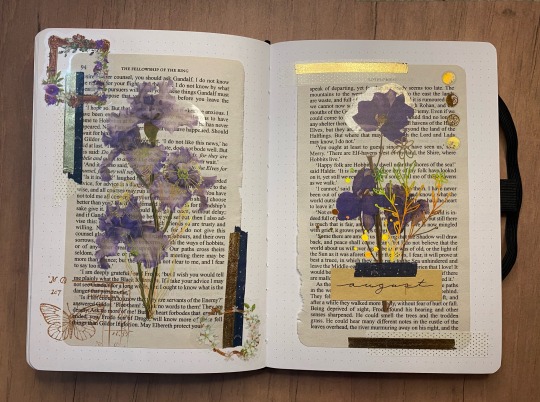
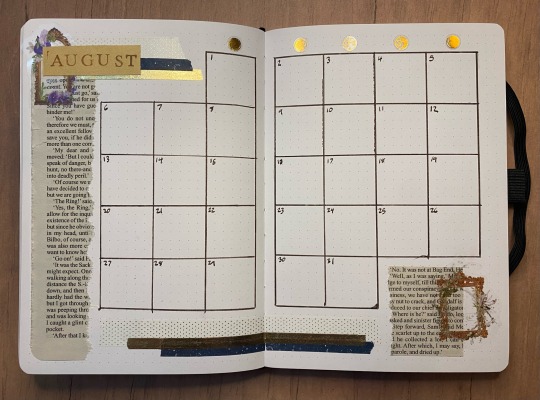
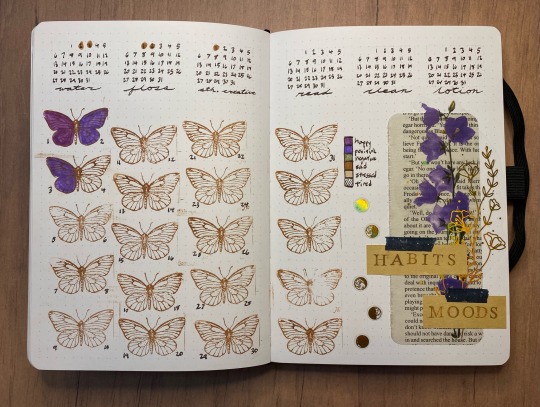
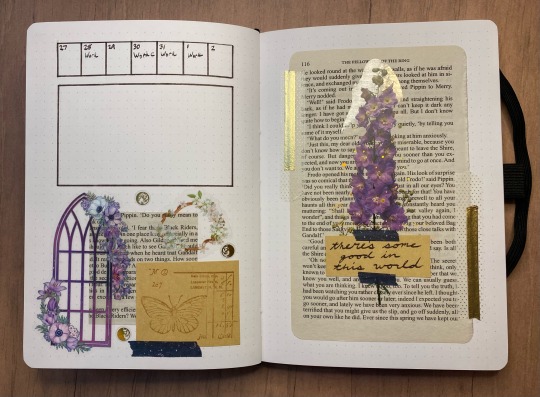
i had a book fall apart on me so i decided to use it as a backdrop for my august theme! it was the perfect thing to pair with these massive floral stickers i have and i think the effect is stunning especially in person
#bullet journal#bujo#i say stuff sometimes#i dont recommend buying an $8 copy of fellowship of the ring#bc pages started falling out before i got even a quarter of the way through the book#but hey now i have plenty of pages to work with#and theyre a perfect size to just slap on the page#an extra bonus is that it doesnt add much thickness to the page like my other setups do#bc my journal is THICCC and she needed a break#i got most of these stickers in subscription boxes and i LOVED THEM but theyre hard to use in my regular style#i’m stoked bc the flowers frames and window are all from different sets but are still cohesive
78 notes
·
View notes
Text
I should probably reread the Tiffany Aching books now that I’m doing witchcraft.
#also because they’re very good#if discworld is too intimidating this might be a good entry point#I first read them in middle school#and I’m sure I didn’t even realize just how good they were at the time#book recommendations#witchy shit#witchcraft#I stand by a good pair of boots being one of a witch’s greatest tools#but mostly I’m thinking about the i shall wear midnight scene#where she takes away someone’s pain or illness#and it hovers over her right shoulder and slowly seeps into her instead#sounds like legit magic to me
29 notes
·
View notes
Text
anyway, i’m leaving for my upstate eclipse trip on friday morning. gonna be about 8-10 hours in the car all by myself. i desperately need entertainment to occupy me during it. can i PLEASE get some music recommendations so i can check it out during the drive
#preferably entire albums !!#but im planning on making a whole playlist so i guess individual songs are fine too BUT PLEASE ALBUMS#just to fill up more time if nothing else 😭😭#literally please drop any recommendation whatsoever i need fucking 10 hours#nvm the return trip which will be another 8-10 hours#You understand my desperation .#im even thinking of maybe audio books but like idk i really cant do them and i cant guarantee i can pay attention while driving#but if i get truly desperate i might turn to that#brot posts#not only is it 8-10 hours alone in the car but its also fucking upstate ny#aka just nothing but the same mountains ovwr and over again#the same fucking road for hundreds of miles#so its not even just the time thats mind numbing. its also the lack of change of scenery#staring at the same damn thing for 10 hours#SO PLEASE GIVE ME RECSSSS
20 notes
·
View notes
Text
read the green bone saga this week and i’m just saying. if you want an in-depth political fantasy mafia thriller (yes all of those words apply) set in a post colonial nation that is navigating an unsure global political position and the potential exploitation of its culturally significant resource that simultaneously explores the bonds between family and how they can take different shapes in the wake of loss and love and life, with brilliantly developed, fleshed out characters and realistic pacing (both in world and in the actual delivery of the story). i HIGHLY recommend.
#truly even the characters who do some hateable things are difficult to hate#everyone makes horrible terrible choices but they are all so sympathetic and understandable#i was STRESSED reading these books i tell you#my only comment is i would’ve actually liked to see the last book spread into two books just bc so much happens and i think some of the#characters could’ve used the additional time to be developed and for us to get to know them a little better but ult i have no real complaint#also i wish it was gayer but that’s that#i was really wowed by these books and i read a LOT of fantasy and i don’t like a lot of it so. trust this is a weighty recommendation#fonda lee the woman that you are <3#the green bone saga#jade city#jade war#jade legacy
53 notes
·
View notes
Text
i made what was a huge medical decision today that has been received very badly by my family and i feel absolutely nothing but pure freedom and joy about it. the thing i'm really fixated on rn is when should i post this fic i just finished
#i think october 1. for halloween#it was for skelly season but it took such a weird turn in the end that i feel weird about gifting it to someone lol#very short list of people i would subject this particular rarepair agenda to on purpose. maybe just beryl#the medical decision is legitimately life-altering and i should be stressed but i'm just like it's my body. my body horror. and i'm free :)#i'm stressin way more about the fic bro#and like if i don't gift the fic do i then go back and commit to making it even weirder and rarepaired....#stars future leadership polycule (two guys who are dating and their captain who holds their hand in high stress situations)#what am i even talking about.....................#today my boss was like thank you for your (insane 11 paragraph long) email! i used it as a meeting agenda with my boss :)#i was like oh no now my grandboss knows i use my boss's inbox as my work livejournal#i got to remake my schedule tho now that i'm almost done with my training!! i gave myself a three day weekend...#...so i can go to the therapy i need to deal with this job. was anyone gonna tell me abt secondary trauma or was i#just supposed to find that out on my literal first day of work lol#my therapist was THRILLED she was like oh i have SO many books to recommend we're gonna have SO much fun!! i was like oh no#fridays off and life is good tbh!! except for the fic. i don't know what to do abt the fic#fresno oilers.txt
39 notes
·
View notes